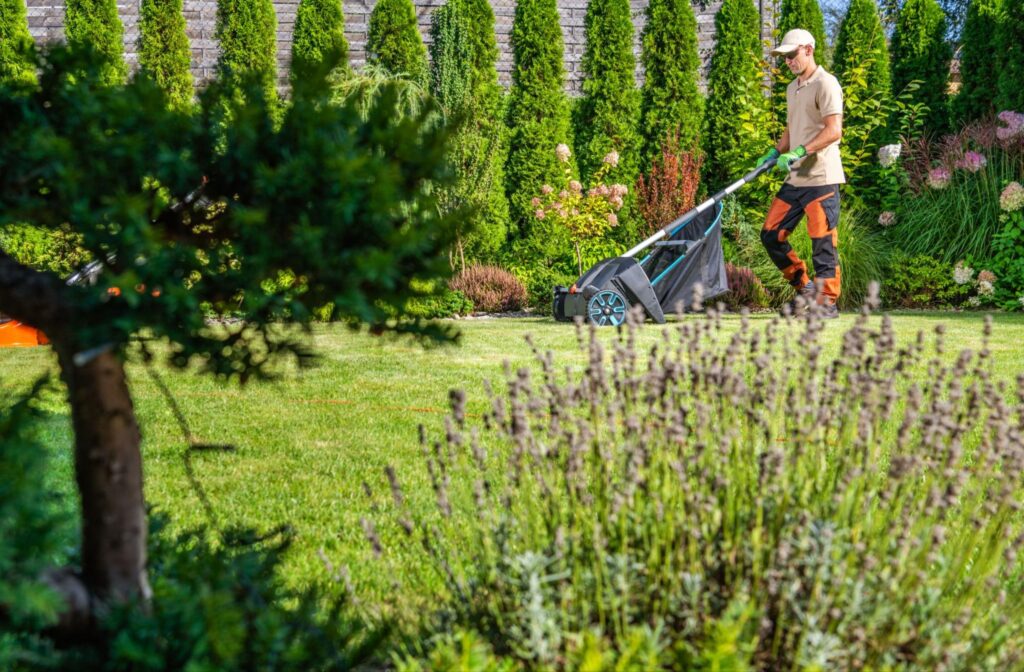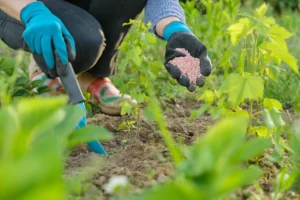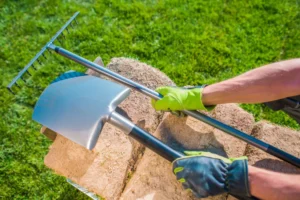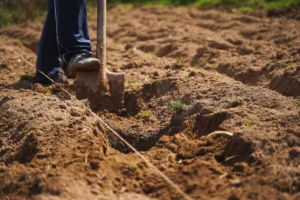Understanding seasonal care in Roswell, GA, is crucial to establishing a lush, fortified turf that can withstand heat, a variety of insect pests, and dormancy itself. The following guide will provide an overview of important climate variables for warm-season grasses, spring fertilization and aeration, summer watering and pest management, fall overseeding and grub prevention, and winter weed management. By timing all of your applications properly for each season and taking advantage of Weed Pro’s environmentally friendly Lawn Care Program, homeowners will have confidence that their lawn will remain beautiful throughout the seasons.
What Are the Key Seasonal Lawn Care Needs in Roswell, GA?
Seasonal lawn care in Roswell, GA revolves around building a seasonal plan based on adapting treatments to changes in temperature, humidity, and soil types to promote healthy turf and enable deep root growth.
This table outlines Roswell’s typical seasonal climate patterns and the primary maintenance focus for each.
| Season | Temperature Range (°F) | Main Maintenance Focus |
| Spring | 50–75 | Pre-emergent weed control and fertilization |
| Summer | 75–95 | Pest management and precise irrigation |
| Fall | 55–70 | Aeration, overseeding, and winterizer fertilization |
| Winter | 35–55 | Dormant weed suppression and plant protection |
Aligning your lawn care efforts with these seasonal factors ensures consistent turf improvement and prepares your lawn for its next growth cycle.
How Does Roswell’s Climate Affect Lawn Care Practices?
Roswell’s humid subtropical climate fosters rapid growth of warm-season grasses in the spring and summer, but also increases the frequency of diseases and droughts. Good lawn management balances deep watering with proper drainage and diseased turf regularly.
Which Grass Types Are Most Common in Roswell Lawns?
In the Roswell area, grass types such as Bermuda, Zoysia, and Tall Fescue are more common due to their heat tolerance and tolerance to foot traffic. Selecting a suitable grass type can help improve drought tolerance and determine the optimal fertilization timing, as well as the mowing height required for maximum density.
Why Is Understanding Soil Health Important for Roswell Lawns?
Roswell soils can range from sandy to heavy clay, which can impact the pH level and compaction of the soil. Conducting a soil test to check pH and applying treatment for compaction through aeration optimizes nutrient uptake, supporting healthy microbes and building stronger root systems.
What Are the Essential Spring Lawn Care Practices for Roswell Residents?

Spring lawn care involves awakening your turf from dormancy, focusing on removing weeds and replenishing soil nutrients, while introducing aeration to promote root development and healthy growth.
Before you start mowing and fertilizing this spring, you should do these important things first:
- Clean your lawn of debris, creating less thatch and compaction in the soil.
- Yes, soil test to determine your lawn pH and any nutrients needed.
- Put down a pre-emergent herbicide to stop crabgrass and broadleaf weeds from developing.
- Put down a slow-release fertilizer that is effective in April when growth begins.
- Aerate any compaction in your Bermuda and Zoysia lawns to allow for improved water penetration.
When and How Should You Apply Spring Fertilization in Roswell?
Apply spring fertilization once the soil temperature is consistently above 55°F, typically late March. Choose a balanced fertilizer that slowly releases nutrients to encourage root growth, help develop a thick canopy, and keep your grass green without excessive growth on top.
How Does Pre-Emergent Weed Control Protect Your Lawn in Spring?
Pre-emergent herbicides create a protective barrier on the soil surface that prevents weed seeds from germinating. This type of weed prevention stops weeds such as crabgrass and dandelions before they germinate, while allowing your grass to establish without weed competition.
Why Is Aeration Important for Bermuda and Zoysia Grass in Spring?
Core aeration is an effective method to reduce soil compaction and thatch, while allowing for greater oxygen and water percolation to the root zone. Aerating in the early spring will help your lawn recover quickly and develop a denser canopy before the active growing period.
How Can Roswell Residents Manage Summer Lawn Challenges Effectively?
Proper summer lawn care involves addressing extreme heat, various pests, and fungal diseases through strategically integrated treatments to maintain turf vigor and moisture levels.
Here’s a comparison of common summer pests found in Roswell and their recommended control methods:
| Summer Pest | Identification | Recommended Control |
| White grubs | Brown patches that lift easily from the soil | Preventative applications of nematodes or insecticides |
| Armyworms | Chewed grass blades and thinning turf areas | Targeted insecticide sprays at the first sign of infestation |
| Mosquitoes | Standing water and visible larvae in water sources | Larvicides in standing water and barrier treatments around the property |
How Do You Prevent and Treat Common Summer Lawn Diseases?
Maintaining consistent mowing heights, maximizing air circulation, and practicing proper irrigation can reduce the likelihood of invasive diseases, such as brown patch or dollar spot. In addition, proactively applying fungicides once symptoms are realized can reduce the spread of the fungus and address the viability of the turf.
What Are Recommended Watering Practices During Roswell’s Hot Summers?
Water deeply and rarely, at about 1 inch a week each spring. Watering in the early morning will help prevent water from evaporating, promote deeper roots, increase drought tolerance, and maintain consistent color and density in the turf.
What Fall Lawn Care Steps Prepare Roswell Lawns for Winter?
Fall treatments play a crucial role in the recovery of lawns as they transition into winter and early spring. These treatments depend on the turf recovery from the summer, the filling in of bald patches, and the vigor of the turf during freeze (cold) weather. The quality function of nutrients (like phosphate and additives) facilitates soil conditioning and quality nutrient uptake. Homeowners need to perform these key fall activities:
- Aerate and overseed your Fescue grass once temperatures consistently drop below 70°F.
- Use a winterizer fertilizer high in potassium to promote root hardiness and winter survivability.
- If you did not control broadleaf weeds last fall, you should do post-emergent weed control before the first frost of the season.
- When temperatures are consistently below 70°F, make preventative grub applications in either late summer or early fall for roots.
- Remove leaves as they fall to promote healthy light to the grass and reduce the risk of disease.
By doing these, you will encourage deeper rooting and thicker grass, resulting in a robust green-up in spring.
When Should You Aerate and Overseed Fescue Lawns in Roswell?
The best time to overseed is mid-September to early October, while soil temperatures are ideally in the range of 60-65°F. Aerating the lawn before adding seed to the soil will improve seed/soil contact and provide the best opportunity for fast germination.
Why Is Grub Prevention Important in Late Summer and Early Fall?
White grubs are insects that feed on primary grass roots, undermining turf health by degrading turf quality and increasing the potential for winter kill. Preventative applications will help disrupt the insect life stage, making it less damaging to roots, which will help prevent winterkill.
What Are the Best Winter Lawn Care Practices for Roswell Residents?
Winter care focuses on not intervening in the lawn, but rather taking preventative steps to maintain health during the dormant phase and prepare for spring recovery.
How Can You Control Winter Weeds in Roswell Lawns?
You would follow this with an applied post-emergent broadleaf herbicide in late December or January to control winter annual weeds, such as chickweed or henbit. It’s best to control these weeds early, before seeding, to reduce the chance of seeding and weed pressure in the spring.
What Are Effective Tree and Shrub Protection Tips for Winter?
It helps to wrap the trunks of young trees with breathable tree wrap to minimize the effects of sunscald or damage from rodents. Mulch applied around root zones regulates soil temperatures and retains moisture, which also helps maintain turf health.
Year-Round Lawn Love Starts Here

At Weed Pro, we encounter all the weather variability – sun-baked summers to cold, wet winters everybody’s grass can get better with a seasonal strategy. Regardless of the forecast, we will work together to maintain healthy turf throughout all four seasons.
[Schedule your personalized seasonal plan now!]
Should you treat your lawn differently in a drought versus a normal spring?
Absolutely. During drought, scale back fertilizer and choose drought-tolerant blends—your soil’s breathing keeps grass alive longer than feeding will.
Is fall really the best time for weed control?
Definitely. Weeds germinate in the fall, so treating them puts you ahead of a spring invasion.
Should you overseed every year?
Only if your turf has thinned, otherwise, planting every two years is sufficient—especially if you’re maintaining density with proper mowing and feeding.
Up Next: The Secrets Behind a Jaw-Dropping Yard
Want your lawn to be the envy of the neighborhood? Stay tuned for: “Achieve a Yard That Wows: Expert Tips for a Vibrant, Healthy Lawn.”







